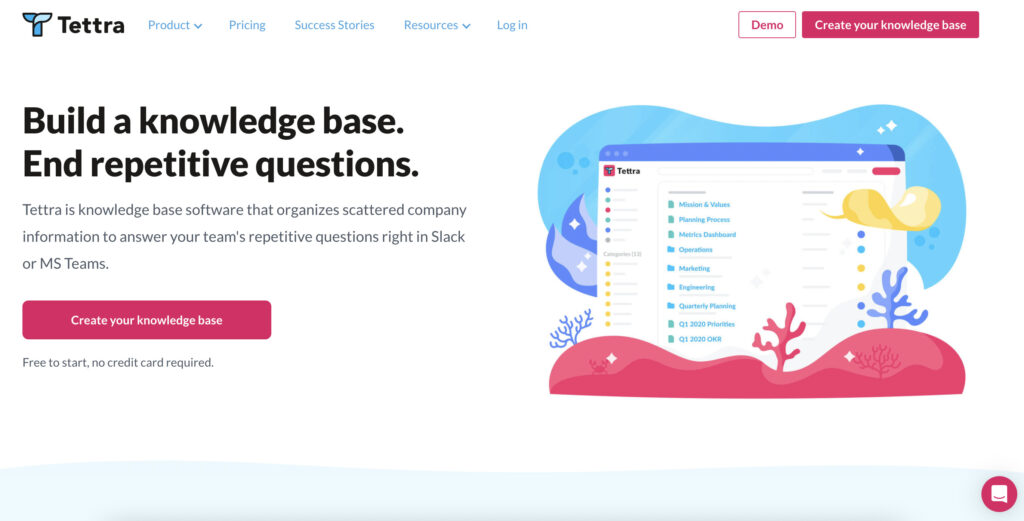Knowledge management software is a program designed to store, retrieve, and distribute any kind of information within the company. It falls under the umbrella of business content management systems and facilitates information exchange that benefits employees, managers, agents, and clients by making information accessible. It typically includes features such as document management, content creation and collaboration tools, search capabilities, and analytics.
Knowledge management tools allow businesses to create a central repository of all business information that has ever been created or shared internally among departments or externally with stakeholders. By using these tools, companies can access archival and current pieces of information whenever they want, in a single command. The ready availability of information provided by knowledge management software enables people to work more productively. Companies can also leverage knowledge management software to create white papers, articles, user guides, and business procedures.
Several knowledge management programs are cloud-based and can operate on any platform, including mobile devices and tablets, enabling users to access data anytime and from anywhere. These software programs feature advanced or intelligent search functions that significantly reduce the time required to conduct information searches.
Let's explore the 15 knowledge management top tools that you should know about today.
1. Document360

Document360 is a knowledge base software that you can use to easily build a self-service knowledge base for your clients or staff members. Any knowledge management software needs to have an effective search module. With Document360, you get the advantages of a potent real-time AI search. This will enable your clients to use AI-powered search to find appropriate solutions to their issues immediately.
Key Features:
-
It supports a wide range of initiatives or documentation websites.
-
It has the best Markdown editor available for productive and organized writing.
-
Different tiers of sophisticated security access address all of your circumstances. Readers can access your content at several levels.
Cost:
Pricing packages begin at $149 a month. Also, you may test out Document360 for free.
2. Trettra

Trettra is a knowledge management software where you can create content using the tool’s simple editor or Google Docs. You can markdown files and efficiently build your knowledge base.
The tool helps in figuring out what to document, keeping it up to date, and deleting stale content. Since missing content decreases the value of a knowledge base, with this tool, you can identify gaps. Your teammates can place a request for page updates or new pages to fill the gaps.
Key Features:
-
Sends alerts for new and updated pages to teams instantly.
-
Easily answer questions where it has been asked.
-
Route questions seamlessly to the right person for them to answer asynchronously.
Price:
Starter: Free
Scaling: $10/ month
Enterprise: $20/month
3. Confluence

Confluence is an Atlassian product for content collaboration. The system is highly compatible with Windows, Android, Linux, and iOS along with being cloud-based. This will make it much easier for you to publish, access, and arrange knowledge in one location. With this application, it is simpler to create a document, offer input, and edit it again.
This tool makes it simpler to create a document, provide feedback, and iterate changes to the document. It is simple to share information and documents. It offers a lot of helpful capabilities, like image copy and paste and PDF output.
Key Features:
-
Gain access to carefully made templates so you can start working right away.
-
Keep tabs on the progress of the article, contrast various revisions and leave in-line comments for team members.
-
Create a custom feed for your home page to keep up with all the progress.
Cost: It will be free of cost for a maximum of 10 users. The price is $5.75 to $11 per user/month for almost 11 to 100 users. The software has a seven-day free trial period.
4. Jira

Jira Service Management Jira helps IT teams get all the resources they need to build a self-service knowledge base. The tool helps you highlight content on websites, documents, and other online resources, so that you can find and solve the issue yourself without relying on others.
Additionally, you can use this platform to monitor how information is accessed in an effort to identify content gaps, enhance articles, and identify the ones that are ineffective. The customized search result, powered by machine learning, is possibly the best feature of Jira Service Management.
Key Features:
-
Encourage clients to seek solutions on their own by placing them in the support centre.
-
Take client input into consideration to provide more timely and useful content updates.
-
Ensure consistent answers to customer questions rather than offering multiple feedback from different sources.
Cost: Jira Service Management is free for a maximum of three agents. The price per agent for its premium plan is $47. There is also a personalised business plan accessible.
5. ProProfs Knowledge Base

ProProfs Knowledge Base is a pretty easy yet effective tool that was created to enhance internal team collaboration and client assistance. It aids in developing both an internal knowledge base for your staff and a self-service information base for your customers. The tool supports almost 90 languages to cater to a larger audience.
You don't need coding knowledge to set it up or utilize it. With its 40+ templates, which make content production quick and simple, you can get started immediately. ProProfs Knowledge Base is the ideal solution whether you are a startup, small business, or corporation looking to build a knowledge base for your clients, support team, HR department, or any other organization.
Key Features:
-
A simple editor similar to MS Word is provided for quick writing and editing.
-
You can evaluate and enhance the performance of articles by analyzing the reports that it provides.
-
Control access by adjusting user roles and permissions. You can set permissions to set up teams.
Cost: Users can use the tool for free for 15 days or buy it for $49 per author per month.
6. ClickUp

ClickUp is the platform for managing projects, tasks, content, information, processes, and time. It is a platform with several features and includes many tools, including docs, chatboards, whiteboards, wikis and reporting.
It serves as the central gathering place for all team knowledge, which can then be accessed to plan and collaborate on work. You can replace all of your team's productivity tools with it or utilize it as a searchtable for both internal and external information bases.
Key Features:
-
Provides the ability to assign permissions, comments and tasks directly from documents.
-
It allows for effective teamwork through multi-player editing.
-
Easy to add visual widgets for tasks, sprints, statuses, docs, members, and more.
Cost: There are four pricing tiers available through ClickUp for the solution: Free, Unlimited ($5 per user per month), Business ($12 & $19 per member per month), and Enterprise (Get a quote). There a free trial is offered for both the Unlimited and Business subscriptions.
7. Zoho desk

Zoho Desk is a highly efficient context-aware help desk. You can manage all of your customer support actions with this tool. It works with iOS and Android devices.
Small and midsize businesses benefit most from using Zoho Desk as it offers cutting-edge capabilities for communicating with agents across VoIP and social media. It also offers data analysis tools so that users will be able to learn more about customer interactions and SLAs.
Key Features:
-
Control who has access to your assistance center, and maintain the highest level of security.
-
Provide users the option to submit tickets through the knowledge management system.
-
Employ meta descriptions and keywords to improve your search engine ranking.
-
Use the built-in reports to track user engagement levels and search habits.
-
Automated suggestions for articles that are pertinent can speed up ticket resolution.
Cost: Up to three agents are free. The other two available options are Professional ($12 per agent/month) and Enterprise ($25 per agent/month) programs.
8. Scribe

Scribe is a lightweight knowledge management tool that may be used to manage articles in a knowledge base. Its main features include writing instructions, taking screenshots while you work through a procedure, and instantly creating step-by-step guidance.
Every process in the company can be recorded with Scribe's process recorder, which is compatible with Chrome, Edge, and your desktop. Your recordings are transformed into step-by-step instructions with screenshots and descriptions by Scribe.
For internal use, Scribe additionally provides knowledge management features like folders, tagging, analytics, permissions, and more. The Scribe library can act as a knowledge foundation for small, agile teams.
Key Features:
-
You can view and use the how-to manuals that Scribe automatically generates, as well as distribute these instructions to anyone via a shareable link.
-
It offers a wide range of customization options, allowing you to brand your knowledge-sharing content.
Cost: Free Chrome add-on with an infinite number of users and guides.
9. LiveAgent

LiveAgent is a superb tool that allows you to build numerous gorgeous knowledge bases.
A robust WYSIWYG editor built into the software lets you easily write and fully customize articles, forums, feedback, and suggestion boxes, and FAQs. In addition to knowledge bases, LiveAgent has strong ticketing software, a built-in call center, a native live chat functionality, and sophisticated automation & reporting functions.
All types of teams and industries can benefit greatly from the programme.
Key Features:
-
You can construct numerous internal and external knowledge bases with articles, forums, and FAQs using LiveAgent.
-
The software is incredibly customizable and easily adapts to your business requirements.
-
Concierge data migrations and implementation are also available.
Cost: Although LiveAgent's most basic pricing plan only costs $9 per month per agent, you can acquire all of its features for just $29 per month for each agent.
10. ServiceNow

The knowledge management tool from ServiceNow is designed to facilitate support for both customers and employees. It seamlessly integrates with Microsoft Word to provide an optimal writing experience, while also offering valuable insights into current knowledge gaps.
You can effortlessly gather information using the tool's AI-powered search mechanism, which generates personalized results. ServiceNow also helps in monitoring knowledge use, aging, feedback, and gaps to tune processes and content.
Key Features:
-
Establish an online community to foster communication between clients and staff.
-
Minimize duplication and create reusable content blocks.
-
Deliver a seamless and efficient search experience for users.
Cost: For further details about pricing, get in touch with them.
11. ComAround

ComAround is perfectly suited to present and future requirements for knowledge sharing in various languages across different locations. With this tool, you can share information on your website, customer service, service management platforms, chatbots, virtual support assistants, and more.
The tool provides a knowledge editor with structured templates for easy editing and publishing. ComAround also provides dashboards to spot knowledge gaps and track ROI and KPIs.
The tool supports Windows 10, iOS, and Android for mobile and desktop users.
Key Features:
-
ComAround streamlines communication for international teams by providing an automated translation of knowledge base content into 100 different languages.
-
The cognitive search tool utilizes text analysis to provide you with synonyms, auto-complete, and auto-suggestions for the queries.
-
When updating the knowledge base, this tool leverages AI and real user data to offer predictive analytics for content creation.
-
You can add videos to knowledge articles or create and attach your own.
Cost: For further details about prices, get in touch with them.
12. Inkling

Inkling is widely used by front-line workers across various industries, including retail, enterprise L&D, and restaurants. The tool provides a single, mobile-friendly platform for creating, storing, and disseminating material. With Inkling Knowledge, users will have a personal library where you can search for and find information. You can easily distribute important information or how-to manuals to clients, customers, and staff members.
Inkling also allows you to design training programs aimed at enhancing employee performance.
Key Features:
-
Offers enterprise knowledge dissemination, mobile optimization, interactive training, and evaluation and measurement tools.
-
The platform functions as both an interactive training tool and a knowledge base for resolving technical problems.
-
It enables you to assess if your team genuinely understands the training material and applies it to their daily job.
Cost: For further details about prices, get in touch with them.
13. KnowledgeOwl

KnowledgeOwl is a versatile software that allows for the creation of a customizable knowledge base for customer assistance. With this program, you can create websites, manuals, knowledge bases, FAQs, and generate PDFs.
The tool offers a free API that enables you to build your own integrations. The tool provides an out-of-the-box search functionality. Your users can fund information immediately, and the tool is even typo tolerant.
Key Features:
- Contact forms enable you to provide feedback directly within the platform.
- A customizable table of contents for easy management of content categories and labeling.
- A copy of the knowledge base can be made to test changes or rebranding.
- Third-party solutions can be used to incorporate videos.
Cost: There are three different pricing tiers: Solo ($79/month), Team ($299/month), and Business ($999/month).
14. KBPublisher

KBPublisher is a web-based knowledge management tool that enables you to create a variety of content types, including articles, white papers, user manuals, and business procedures.
This tool is accessible via mobile devices and tablets, making it easy to share knowledge with clients, staff members, business partners, and coworkers
Key Features:
- Customizable fields and LDAP authentication for secure access control.
- Reduces the number of calls from customers by providing an efficient self-service customer knowledge base.
- Role and group-based access control for enhanced security.
Cost: Prices begin at $198.
15. Knowmax

Knowmax is a highly regarded knowledge management platform equipped with AI capabilities that enhance the customer experience by ensuring timely access to accurate information. The platform effectively streamlines the flow of both internal and external data across all touchpoints, while also organizing data that may be dispersed across silos.
By leveraging Knowmax's cloud-based knowledge platform, users can create decision trees, articles, FAQs, and visual instructions to deliver seamless customer assistance.
Key Features:
-
Deliver helpful information to customers in a variety of formats.
-
Create and modify knowledge practices to significantly enhance customer support operations.
-
Establish roles, add users, delegate responsibilities, and assign designations.
-
Enable or disable authorization for specific users.
Cost: For further details about prices, get in touch with them.
Things To Consider Before Choosing Knowledge Management Tools
Easy to use
Ensure the knowledge management solution you select is simple to use and doesn't need a lot of training. Everyone can save time with simple employee onboarding.
Management of documents
Digital document management is the method used by software to store documents (e.g., it keeps track of document versions and who made changes). All of your documents can have an audit trail thanks to this functionality.
Know-how base
Computerized systems called knowledge bases hold both structured and unstructured data. They can hold your company's documentation, such as processes, instructions, and content archives.
Centralised source of information
Knowledge management software's ability to safely store and make accessible your company's knowledge is one of its most crucial features (to all the right people). Workers should be able to locate information easily and feel secure that the documents they find are up to date.
Search capabilities
The search feature aids staff in locating the information they need. A search function must have the ability to trawl through the email digest, knowledge management system, and other third-party tools to offer any results that might be connected to the information users are looking for.
Collaboration skills
Users should be able to share, exchange, and engage with documents using straightforward collaboration features. Make sure the there aren't too many limits on how collaboration happens or the number of people who can work simultaneously on the same document.
Channels of communication
Effective knowledge management systems serve as centres for communication. As a result, they have alternatives for static and dynamic communication that facilitate effective knowledge sharing.
Security
You need a mechanism to protect that content when working with various types of information, including blog posts, customer data, contracts, and policy documents. Enhanced security features are available in the top knowledge management systems.
Integrations
You don't have to change any existing third-party products in your organisation just because you purchased new knowledge management software. You can link your latest knowledge management solution with other software programmes you use by using integration capabilities (such as the availability of an API).
Conclusion
Finding, sharing, and retaining knowledge inside your organisation is made simple by a knowledge management platform. It gives your team a single source of truth, motivates them to work well together, and helps them analyse and improve your material. Hopefully, this blog will help you choose the perfect knowledge management tool for your company.
FAQs
What are knowledge management tools?
Knowledge management software is a solution that compiles all of your business's knowledge onto a single platform for simple access and searching. You can easily distribute to both internal audiences of coworkers and external audiences of clients with the help of this communal reservoir of practical business knowledge may be.
How to use Knowledge management tools?
You could use Knowledge management software to successfully gather and allocate both internal and external information for your company.
What are some examples of knowledge management tools?
Knowledge management platforms include learning management systems, customer service knowledge bases, research and insights libraries, and online community forums.
What advantages does knowledge management software offer?
Increased customer satisfaction, support for innovation and cultural change, and quicker access to knowledge and data are some benefits of knowledge management software.
What features would you seek in a knowledge management programme?
Tools for knowledge management systems should have a user interface that is simple to use, mobile-friendly, have strong search functionality, and allow for customization.


